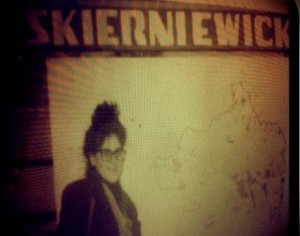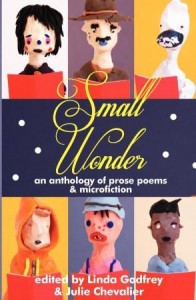 1. What inspired you to write the prose poem/ micro fiction which is published in small wonder?
1. What inspired you to write the prose poem/ micro fiction which is published in small wonder?
The realisation that I may never find the right words to describe my visit to Skierniewicza. My grandmother’s parents and siblings were victims of the holocaust. They simply vanished. I wanted to at least try to describe how I felt when I visited their town.
2. Tell us about the process. (Do you start sparse and widen out, or do you write down every possible association and cut back ? Do you research the subject matter you are writing about. Is it pure intuition?) Take us through an example if you want.
Before I left for my trip to Poland my grandmother gave me a Skierniewicza shtetl memorial book. The book contained a photo of my great grandmother. I wanted to find out what happened to her and this image became the focal point of my research. I eventually turned away from the research and looked for techniques to link the present with the past. I put the story aside and started to think about displacement and the power of the absurd.
3. What advice do you have for other writers about the first or last line? About how to choose the title? Do you follow any rules?
Set your direction but be prepared to change it. Perspective and distance is essential and I try to write the title as well as the first and last line after the story is complete. If I am not writing to a deadline I put the story away and come back to it later. If that is not possible, I create three or four versions of the same document then read them when I am away from the computer. I cannot explain the reason why, but this helps me get a sense of perspective. I always create documents that look professional and try to feel confident that they will find a home.
4. Who or what inspires your writing?
I can still remember the days when I called my pets “Nately”, “Yossarian” and “Holden”and wrote “Sleep tight ya morons” on bathroom walls. Today, I am inspired by the elusive nature of truth and writers like Schulz, Borges, Camus, Duras and Stein. I am inspired by new forms and new codes. The relationship between politics and literature has always fascinated me and I am inspired by cultural reinvention and those who work towards conciliation. I am also inspired by marginal and disadvantaged writers. There is a lot of elitism and arrogance in the literary world and I think it is important that it is acknowledged.
5. Tell us what you do if you haven’t written anything for while and you want to get started writing again. Could you share your favourite writing exercise with our readers?
My ideas often emerge as concept and I have to wait for the story to arrive. In the early stages I express the concepts as microficton and prose. If I haven’t written anything for a while I often read over some of my old work then take a long walk and wait. I usually find another dimension or theme. I find good writing difficult to force so I tend to wait until there is something I want to write about. I need time to allow my thoughts to wander and make new associations. When I do have a good idea I write it quickly and try not to worry about spelling or grammar. I know I can edit anytime but good writing requires inspiration and a certain mood. I do not really have a favourite exercise but I do have a copy of Charles Bukowski’s poem “So you want to be a writer” above my desk and often attend literary events and festivals.
To listen to Monica reading The Stranger from Skierniewicza, click here.
Monica Goldberg is a surrealist poet writer and artist. Her short fiction and poetry has been published in literary journals and anthologies both in Australia and overseas. Her poem Theories of Everything was selected for The Best Of Every Day Poets Two (Every Day Publishing, 2012). She is currently completing a novel about converso’s and the significance of cryptic faith.

